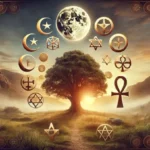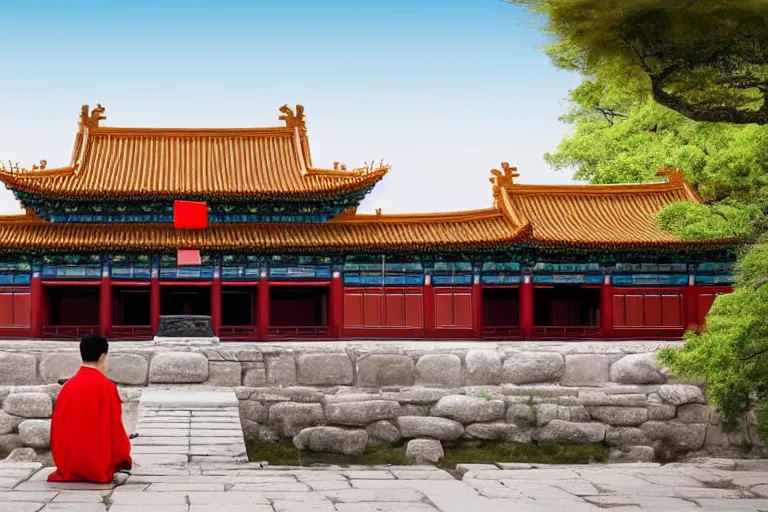Exploring the philosophy, ethics, and religious aspects of Confucianism
Confucianism is an ancient Chinese philosophy that emphasizes personal and governmental morality, correctness of social relationships, justice and sincerity. However, its status as a religion has been a topic of debate for centuries. In this article, we will delve into the details of Confucianism to determine whether it can be considered a religion.
The Origins of Confucianism
Confucianism, often shrouded in mystery and misunderstood, traces its roots back to ancient China, where it emerged from the teachings of one man: Confucius himself. Born around 551 BCE, Confucius was not a deity nor a prophet, but rather a philosopher whose ideas have profoundly influenced East Asia for over two millennia.
Imagine walking through a forest, trying to navigate its twists and turns. Confucius offered us the map—a set of guidelines that could help us find our way in this complex world. His teachings were compiled into the Rites of Zhou, which laid down detailed rules for social behavior and hierarchy.
It’s a bit like trying to understand the rules of a game you’ve never played before. Confucius didn’t just tell people what was right or wrong; he explained why certain behaviors were essential in maintaining harmony within society. His philosophy emphasized benevolence, righteousness, and propriety, much like the golden threads that tie together a beautifully woven tapestry, giving it strength and beauty.
The concept of a ‘ritual’ or ‘li,’ in Confucianism, goes beyond mere formalities. It’s about performing actions with sincerity and respect, ensuring that every interaction contributes to social order and well-being. This is akin to how every piece in a puzzle finds its perfect place, making the whole picture complete.
Over time, these teachings evolved. While Confucius himself might have been more of a sage or teacher, his ideas became the foundation for a vast system of thought that included politics, education, and social order. It’s as if he started planting seeds in a garden; today, those seeds have grown into a lush, vibrant landscape that continues to shape the lives of millions.
So, when we ask whether Confucianism is truly a religion or merely a philosophy, it’s like asking what a plant is—whether it’s just green leaves or something more complex and interconnected. Confucianism does offer a moral code, but unlike traditional religions, its focus lies in practical ethics rather than spiritual salvation.
Thus, we can see that the origins of Confucianism lie not in divine revelation, but in human wisdom and societal needs. It’s about creating an environment where people live harmoniously together, each part of a larger whole, much like the intricate patterns found in a traditional Chinese painting or the ordered chaos of a bustling marketplace.
Key Principles of Confucianism
What exactly is Confucianism, you might wonder? Is it merely a philosophy or does it carry religious undertones? To understand this question fully, we must delve into its core principles—benevolence, righteousness, propriety, wisdom, and trustworthiness. These values are like the golden threads that weave through the fabric of Confucianism, giving it both its structure and its essence.
Let’s begin with benevolence. It is often translated as kindness or good will towards others. But can benevolence be a mere act of niceness? Isn’t there more to it than just being nice to people? Benevolence in Confucianism goes beyond surface-level politeness; it’s about the genuine care and respect for all individuals, a philosophy that mirrors the idea of “Do unto others as you would have them do unto you.”
Righteousness, on the other hand, is not just about being morally upright. It involves acting according to one’s duties and responsibilities towards others. Think of it like a moral compass that guides individuals in making choices that benefit society as a whole. Can we truly say someone is righteous if they only act virtuously when no one is watching? The concept of righteousness is deeply intertwined with the idea of accountability, ensuring that every action has its proper place and purpose.
Piety, or propriety, is another fascinating principle. It’s about adhering to societal norms and rituals that maintain harmony in society. How many times have you wondered why certain customs exist? Propriety isn’t just about following rules; it’s the art of living in a way that fosters mutual respect and understanding among people. In essence, propriety is like the glue that holds a community together.
Wisdom—this is not merely intellectual knowledge but practical wisdom, the ability to make sound judgments based on experience and understanding. How many times have you found yourself in situations where knowing what’s right isn’t as simple as it seems? Wisdom involves looking beyond immediate consequences and considering long-term effects.
Trustworthiness, or jing, is the cornerstone of any relationship, both personal and professional. Can we truly say that trust is easy to come by in today’s world? Trustworthiness isn’t just about honesty; it’s about reliability and keeping one’s promises. It’s the backbone of all social interactions.
In essence, these principles—benevolence, righteousness, propriety, wisdom, and trustworthiness—are not just ideals to be admired from afar. They are meant to be lived out in our daily lives, shaping who we are as individuals and how we interact with the world around us. By embracing these values, Confucianism offers a path towards a more harmonious and fulfilling life.
Confucianism in Chinese Society
How does Confucianism weave through the fabric of Chinese society, politics, and culture? Is it merely a philosophy or has it transcended to become more than just a set of ethical guidelines? Think about it—Confucius (Kongzi), born in 551 BCE, lived during a time when the Zhou Dynasty was crumbling, and his teachings were a response to social disorder. But how did these ideas take root so deeply that they continue to influence Chinese society millennia later?
Consider this: Confucianism is like a river, its waters flowing through dynasties, adapting to new landscapes while maintaining its essence. Just as water can carve through stone over time, Confucian principles have shaped China’s societal norms and expectations. From the family structure to political governance, from personal conduct to cultural festivals—Confucian values permeate every aspect of Chinese life.
Imagine a tree with deep roots, providing shade and shelter for generations. Similarly, Confucianism has provided a moral framework that guides individuals in their interactions with others. It promotes the idea of yì (righteousness), which goes beyond just doing what is legally correct to encompass actions guided by virtue and goodness.
In terms of social hierarchy, Confucianism places great importance on xìnlǐ (benevolence) and yìlǐ (propriety). These principles suggest that individuals should prioritize the well-being of others before their own interests. It’s as if every member of society is a piece in a puzzle, each contributing to the overall harmony of the community.
The influence of Confucianism on Chinese art and literature is also profound. Poets and writers have long used its themes—such as loyalty, filial piety, and respect—to explore human nature and societal roles. Through poetry and prose, these values are not just preached but celebrated in the fabric of Chinese artistic expression.
From a political perspective, Confucianism has played a crucial role in shaping government policies and ethics. The idea that leaders should be wise and benevolent, always seeking to benefit their subjects, aligns with Confucian ideals. This has led to governance practices that emphasize meritocracy and the education of officials.
In essence, Confucianism is not just a philosophy; it’s a way of life that continues to shape China’s identity. As we delve deeper into its impact on government institutions in the following chapter, consider how these values have influenced every aspect of Chinese society. How can one truly understand China without understanding Confucianism?
The Role of Confucianism in Government
When we think about Confucianism’s role in government, it’s like looking at a vast river that has shaped the course of Chinese history for millennia. But is it truly a religion, or more accurately, an ethical and philosophical framework that permeates every aspect of governance?
Can we separate the sacred from the secular when it comes to Confucianism’s influence on government? Is it merely a set of moral teachings, or does it hold spiritual significance for the Chinese people?
In ancient China, Confucius (Kongzi) taught that governance should be based on virtue and wisdom, not just power. This idea can be likened to a tree whose roots are deeply embedded in the earth and branches spread wide to offer shade and support. Just as the tree needs its roots for stability, Chinese rulers found their strength in Confucian principles.
-
The philosophy of Li, or ritual propriety, guides how officials should conduct themselves and maintain social order. It’s like following a well-worn path that ensures harmony and balance in society.
-
Ming-zi, the concept of moral authority, underpins the idea that leaders must be virtuous to lead effectively. This principle is akin to a lighthouse guiding ships through treacherous waters.
-
The notion of Ren, or humaneness, emphasizes empathy and benevolence in governance. It’s as if every ruler carries a magnifying glass, focusing on the needs and well-being of their people to ensure their happiness and prosperity.
Through these principles, Confucianism has not only shaped the way government operates but also infused it with a sense of purpose beyond mere administrative functions. It’s like weaving a tapestry where each thread represents a value or principle that strengthens the whole fabric of society.
Is it then accurate to say that Confucianism, in its role within government, is not just about politics but also about creating an ideal moral community?
In many ways, the integration of Confucian ethics into governance has been a continuous effort to refine and perfect this communal harmony. It’s a journey that continues to evolve with each new generation of leaders and thinkers who seek to live up to the ideals set forth by Confucius.
Confucianism as a Religion
Is Confucianism a religion? The answer, like much of life’s complexities, isn’t straightforward and often depends on your perspective. Some argue that it is, while others insist that it is primarily a philosophy or ethical system. Let’s dive into this question by exploring the philosophical and ethical aspects of Confucianism.
Imagine Confucianism as a vast garden, where rituals, virtues, and social norms intertwine to create a harmonious ecosystem. Just like how a religion might prescribe rituals for its followers, Confucianism encourages certain behaviors—like jichang (filial piety) or ren (humaneness)—to maintain social order and moral integrity.
But is this enough to classify it as a religion? Consider the concept of sacrifice. In many religions, sacrifice plays a significant role. Could performing rituals like worshiping ancestors or participating in community service be seen as a form of spiritual offering? The answer might be yes, but for some, it’s more about upholding moral principles than worshipping deities.
Moreover, the idea of a afterlife is often central to religious belief. In Confucianism, the concept of li (ritual propriety) guides individuals in living virtuously, which could be likened to preparing for a better existence post-life. However, this isn’t necessarily seen as a form of worship or prayer.
The question then becomes: Is it the nature of beliefs and practices that define a religion? Or is it the intention behind them? If Confucianism focuses on ethical behavior and societal harmony rather than deities or an afterlife, might it be more accurately categorized as a philosophical system?
But here’s the rub—Confucianism has historically influenced not just ethics but also governance and education. Its emphasis on education and meritocracy, for example, can be seen as a way to shape societal values and behaviors. This influence on society could argue that Confucianism serves a religious-like role in shaping the cultural identity of its adherents.
In conclusion, whether Confucianism is a religion or not hinges on one’s definition of what constitutes a religion. It certainly embodies many elements typically found in religions but places more emphasis on ethical conduct and social harmony. As we explore further, you’ll see how this philosophical system continues to shape contemporary China and the global community.
The Legacy of Confucianism Today
Confucianism, often seen as more of a philosophy than a religion, has left an indelible mark on East Asian societies for over two millennia. But is it really a religion? Some argue that its focus on ethics and societal order blurs the lines between philosophy and religion. Others see it strictly within the realm of philosophy, emphasizing humanistic values without divine intervention.
Is Confucianism a religion or not? Think about it this way: if religion is defined by its quest for spiritual truths and moral guidance, then Confucianism offers profound ethical teachings that can guide one’s life. Yet, unlike many traditional religions, it does not require belief in deities or supernatural entities. It centers on practical wisdom and human relationships, making it more of a way of life than a faith.
Take the sage, for instance—Confucius himself is revered as the ultimate sage, whose teachings continue to shape东亚社会的行为准则。他是超越神祇的存在,更像是一个智慧的导师而非宗教领袖。
Consider how Confucianism influences contemporary Chinese society. From government policies that promote social harmony and personal responsibility to educational systems emphasizing traditional values like filial piety and respect for elders, its influence is pervasive. It’s not just about past practices; it’s about shaping the future of a country that continues to grapple with modernization while seeking balance between tradition and progress.
In today’s global context, Confucianism offers valuable insights into human ethics and social governance. As we navigate complex issues like globalization and cultural exchange, its principles—such as the importance of interpersonal relationships and communal harmony—provide a counterbalance to individualistic Western philosophies. This makes it not just relevant but essential in understanding the dynamics of modern society.
Conclusion
 By the end of this article, you will have a clear understanding of the philosophical and ethical aspects of Confucianism, as well as an informed perspective on its religious nature. Whether Confucianism is a religion or not, its impact on Chinese culture and society remains undeniable.
By the end of this article, you will have a clear understanding of the philosophical and ethical aspects of Confucianism, as well as an informed perspective on its religious nature. Whether Confucianism is a religion or not, its impact on Chinese culture and society remains undeniable.











